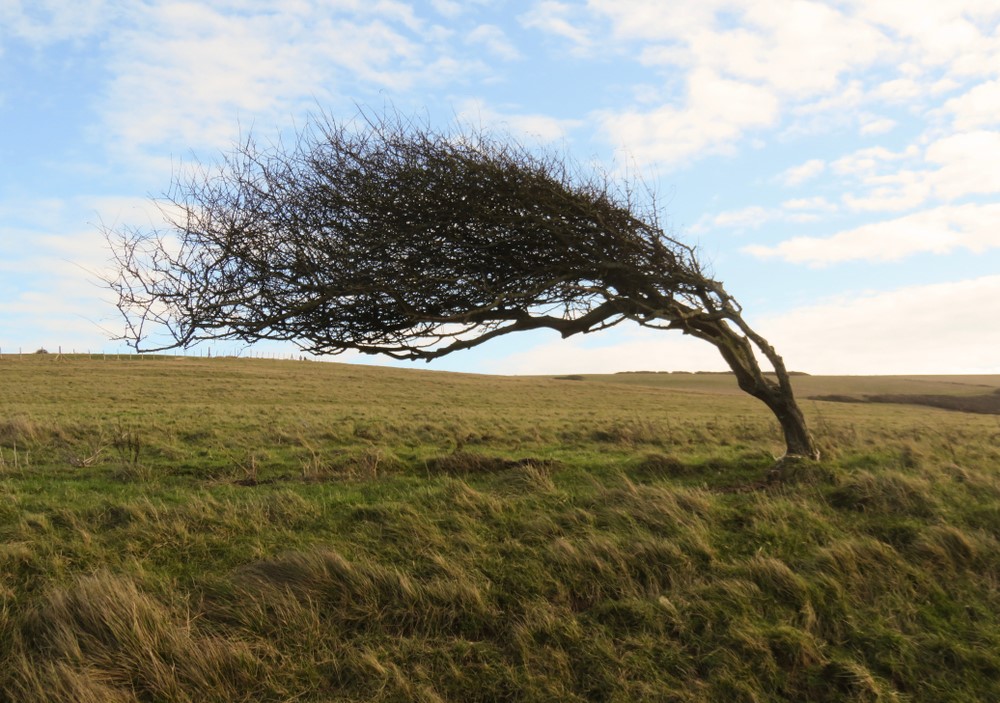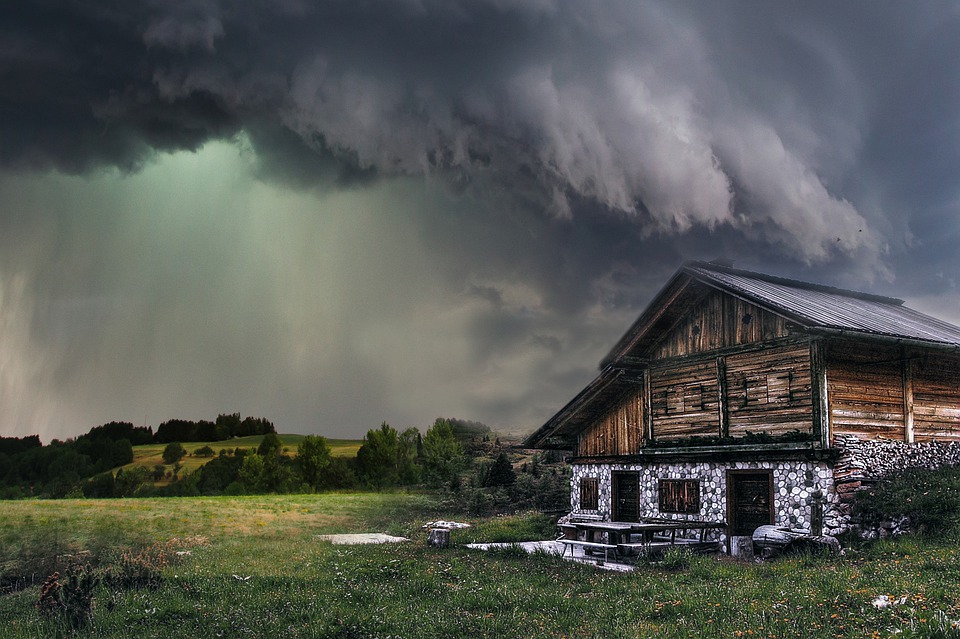The English language contains a large number of weather idioms. Most of them use the weather as a metaphor for something else apart from the weather itself.
On
this page, I’ve included the weather idioms that you are most likely to see or want
to use in your IELTS exam.
They
can be used in your Speaking test and you may occasionally hear one in the Listening test. Idioms
are informal language so less likely to appear in the Reading texts and are too
informal to use in your Writing exam.
Most
idioms are quite difficult to use correctly and it’s better not to use them at all
than risk using them incorrectly or inappropriately. Only use one if you are 100% sure you can use it correctly.
Having
said that, many weather idioms are fairly simple to understand and use which is
why I’ve created this list for you.
*
Important
Don’t
try to learn this list of weather idioms.
The list will help you to become familiar with them but please don’t try to memorise them all. If there
are a few that you like and think you’d find particularly useful, pick them out and learn
them fully. It’s vital to practice using them often so they flow naturally in your speech.
The
best ones to choose are those you think could potentially be used in several
different situations.
I’ve
divided the list into groups based on the type of weather they’re related to. This will help you to find your way around them.
List of Weather Idioms
We’ll start with a couple of general ones:
in all weathers – in every kind of weather, both good and bad.
— I belong to a
rowing club and we train on the water in all weathers.
to feel
under the weather – to not
feel very well.
— Uma decided not to go to the party
as she was feeling under the weather.
Weather Idioms Related to Rain
raining cats and dogs – raining
heavily.
— It’s been raining cats and dogs all day.
as
right as rain – to be healthy.
— I had
a horrible cold last week but I feel as right
as rain now.
to
take a rain check – to decline an offer or invitation for
the time being.
— Yes,
I’d love to see the movie with you but I’ll have to take a rain check tonight as I’ll be late finishing work.
it never rains but it pours – when several things go wrong in quick succession.
— First I got stuck in traffic, then
I couldn’t find a parking space and now the lift isn’t working. It certainly never rains but it pours.
to save for a rainy day – to save money for the future, especially to
cover unexpected expenses.
— I always put 10% of my wages in
a savings account as I believe it’s important to save for a rainy day.
come
rain or shine – whatever the situation.
— Good
friends are always there for you come rain
or shine.
to chase rainbows – when someone pursues something they’ll probably
never get or achieve.
— Kalifa is convinced this new business
idea will make him millions but he’s just chasing
rainbows.

Weather Idioms
Related To The Wind
to throw caution to the wind – to do something without worrying about the risk
or the results.
— I’m a bit nervous about going
on holiday on my own but I’m throwing caution
to the wind and booking a trip to Venice.
to get wind of something – to begin to suspect something or hear a
rumour.
— Beatrice got wind of the account manager’s resignation and thought she might
go for her job.
to sail close to the wind – to behave in a manner that is close to the limit of what is acceptable, allowed, or safe.
— I admit that he gets some great
deals for the company but I think he’s sailing
a bit close to the wind this time.
windfall – a large
amount of money that is won or received unexpectedly.
— Asha was delighted to receive a
windfall on the death of a wealthy relative
she hardly even knew.
to be
a breeze: to be very easy
or simple.
— I was
dreading the English exam but it turned out to be a breeze.

Weather Idioms
Related To Clouds
to have your head in the clouds – to
be out of touch with reality or have unrealistic ideas; to be a daydreamer.
— I’m not sure the new secretary
was the right person to appoint for the job, she seems to have her head in the clouds most of the time.
to cast a cloud – to cause people to feel unhappy about something.
— Their argument
in the car on the drive down to the coast cast
a cloud over the whole weekend break.
every
cloud has a silver lining – for every
bad situation there is something good that can come out of it.
— I was so cross when I missed the train but every cloud has a silver lining and on the
later train, I sat next to a lovely girl who’s agreed to go on a date with me.
on
cloud nine – to be extremely happy.
— Jamilla had been waiting for years for her boyfriend
to propose and was on cloud nine when
he finally asked her to marry him.

Weather Idioms
Related To Sunshine or Fine Weather
to take a shine to – to like someone immediately.
— My brother’s really taken a shine to the girl who’s just moved
in next door.
ray of sunshine – a person who brings happiness into the
lives of others (sometimes used sarcastically about someone with a negative
attitude).
— I always hope that Grace is on
reception when I go to the dentist. She’s such a ray of sunshine and makes the visit much less stressful.
ray of hope – something that provides a small amount of hope in a difficult situation.
— The new drug offers a ray
of hope to people suffering from this rare genetic disorder.
fair-weather friend – a
friend who cannot be relied on in difficult times.
— Amir
got on really well with Julio from his football team but he turned out to be
just a fair-weather friend and
stopped coming round when Amir got dropped from the team.
dry spell – a period of little or no productivity, activity or success.
— I used
to achieve top salesperson in our company nearly every month but I’m going through a
bit of a dry spell at the moment.
out of the blue – unexpectedly, without warning.
— I
thought she was happy in our marriage but then, out of the blue, she said she was leaving me.
bolt from the blue – an unexpected or sudden event, usually
unwelcome.
— The threat of redundancies came
like a bolt from the blue.

Weather Idioms
Related To Storms
to go down a storm – to be popular or well received.
— The new flexible working hours went down a storm with the staff.
calm before the storm – a period of calm and stability before a
time of great activity or difficulty.
— The children would be arriving
for her daughter’s party in just over an hour but everything was ready so she
sat down for a cup of tea in the calm
before the storm.
to weather a storm – to successfully deal with a problem or to
get through a difficult situation.
— The business nearly went under
during the recession but they managed to weather
the storm and profits are now rising steadily again.
a
storm brewing
/ a storm on the horizon – a situation where something
unpleasant is about to happen despite everything currently being calm.
— Although no-one has openly
objected to the radical shake-up on the team, the coach could sense a
storm brewing.
—
Cherie is yet to find out that her best friend went out with her ex-boyfriend
and I sense a storm on the horizon.
stormy relationship – a relationship characterised by lots of
arguments.
— Katia
and Hugo had always had a stormy relationship so no-one was surprised
when they split up.
to take by storm – to suddenly be very successful in a particular
place or with a certain group of people.
— The new band took the audience by storm when they appeared at their first gig.
storm in a teacup – a
small problem or event that has been made more significant than it really is.
—
The row over who used the last teabag was just a storm in a teacup.
to steal
someone’s thunder – to
take the attention away from someone or deny them praise or success but saying
or doing something they were going to do or say first.
— I was so angry at Arash for
leaking information to the staff about the exciting bonus package I was going to reveal in the meeting. He really stole my thunder.
face like thunder – looking very angry.
— I knew Mum had told Dad about
the dent I’d put in his car because he stormed into the room with a face like thunder.
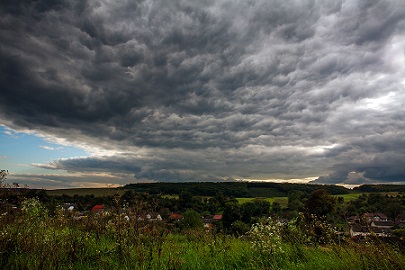
Weather Idioms
Related To Ice or Snow
tip of the iceberg – a hint or suggestion of a much larger problem or more complex hidden
issue.
— When she called in the accountant after finding an error in the
bookkeeping, it was soon discovered that this was just the tip of the iceberg and that a large sum of money was missing from
company funds.
to break the ice – do or say something to relieve tension or get a
conversation going in a strained situation or when strangers meet.
— I always invite Freja to
charity dinners as she’s great at breaking
the ice.
snowed under – very busy, or overloaded with work or
things to do.
— I really try to get home in
time to eat with the family in the evening but I’m snowed under at work at the moment and rarely manage it more than
once or twice a week.
put on ice
– to postpone for another time.
— We
were making good progress with the project but it had to be put on ice when government funding
dried up.

Using Weather Idioms
Did you recognise any of these weather idioms? Have you heard them when listening to native English speakers talk?
I certainly recommend listening out for them from now on. Now that you’re familiar with them I’m sure you’ll begin to notice them more.
When you do hear them, take note of how they’re used in context. This will really help you to understand them better and be more able to use some of them yourself.
But please do head my warning of learning just a few really well and only using them if they’re entirely appropriate for what you want to say and you can use them 100% correctly.
For a whole page of common weather vocabulary and some related IELTS-style questions and answers, visit my Weather Vocabulary page.
Like this page?
-
Home
-
Weather Vocabulary
-
Weather Idioms
›
›
-
Back To Top
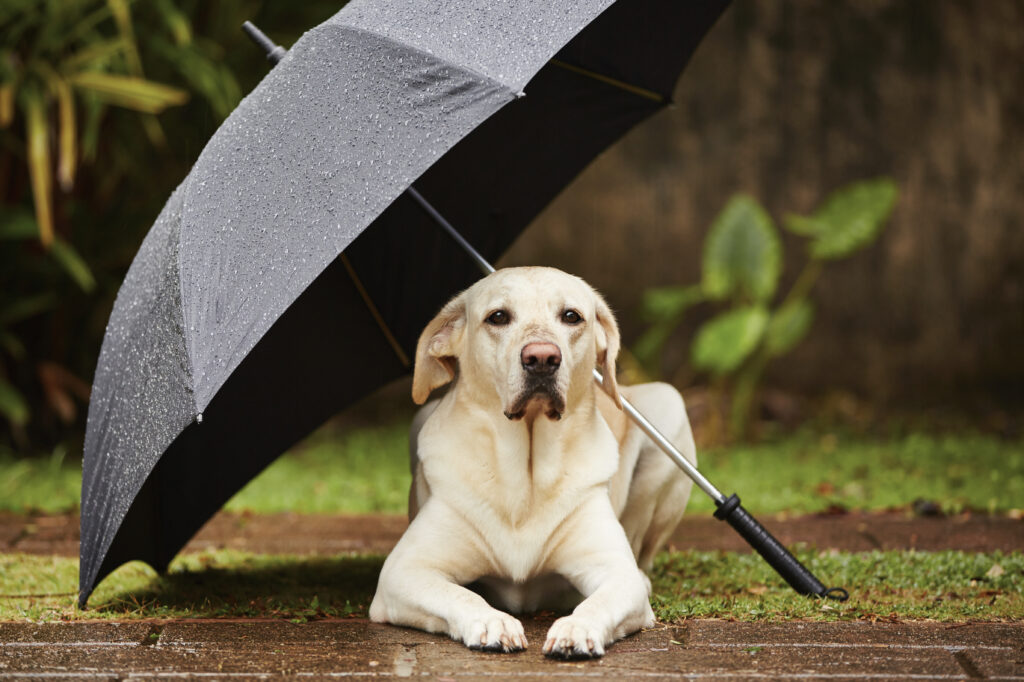
By
Last updated:
September 30, 2022
In English, talking about the weather is a common small talk topic.
But you might hear someone say that they’re “feeling under the weather” or they want to “take a rain check.”
These are idioms that aren’t actually about the weather at all, so don’t take them literally!
In this post, we’re going to learn how to use English weather idioms to talk up a storm (talk a lot) about different topics.
Contents
- General Weather Idioms
- Rain Idioms
- Rainbow Idioms
- Wind Idioms
- Storm Idioms
- Ice and Snow Idioms
- Sun Idioms
- Why Learn English Weather Idioms?
- How to Practice English Weather Idioms
Download:
This blog post is available as a convenient and portable PDF that you
can take anywhere.
Click here to get a copy. (Download)
General Weather Idioms
1. Under the weather
If you’re feeling “under the weather,” it means that you don’t feel well.
The term originally came from the phrase “under the weather bow.” (In this phrase, “bow” rhymes with “cow.”)
The “weather bow” was the part of a ship that was getting hit with bad weather, such as heavy rain or storms. Sailors would go below deck so they wouldn’t get seasick. In other words, they would be “under the weather bow.”
Over time, even people on dry land started using “under the weather” to mean feeling ill.
Check out the phrase in more detail in this video:
2. Fair-weather friend
“Fair” weather is pleasant and sunny. It’s not too hot or too cold. It’s perfect for having fun, especially outdoors.
A “fair-weather friend” is someone who’s only around when things are going well—when you’re having fun, in a good mood or have money to spend.
The minute something bad happens, a fair-weather friend will suddenly have other plans.
3. Weather the storm
This one can be a little confusing. When we say “weather” in English, we’re usually talking about how hot or cold it is outside, or whether it’s rainy, snowy, windy or sunny.
“Weather” can also be a verb (action word), though.
In the idiom “weather the storm,” the word “weather” means “to get through” or “to survive.” “The storm” in this phrase could be any difficult time or challenge.
Put it together, and this idiom means to survive a difficult challenge.
So, you might say:
“Fred is going through a hard time right now, but he’ll weather the storm.”
This means that Fred will overcome whatever problems he has.
4. Keep a weather eye on someone/something
A “weather eye” doesn’t mean that rain, snow or sunshine is in someone’s eye!
A “weather eye” is a close watch. Because the weather changes so much, we have to watch it carefully. We don’t want to be surprised by a sudden storm.
If you “keep a weather eye” on someone or something, it means that you’re worried about that person or thing. You’re concerned that a sudden change might cause a problem.
Here’s an example:
“Gary is keeping a weather eye on the stock market because he’s worried about a crash.”
Rain Idioms
5. It’s raining cats and dogs
This means it’s raining very heavily.
This idiom may come from strange happenings around the world. For hundreds of years, people have talked about “rains of animals.” They’ve mentioned animals such as fish, frogs, birds and snakes falling from the sky like rain.
You can see this idiom explained in the video below:
6. When it rains, it pours
In this idiom, “rain” refers to something bad that makes life more difficult.
“It pours” tells you that many bad things are happening all at once.
In British English, a similar idiom would be: “It never rains, but it pours.”
You can use this weather idiom to talk about a situation where everything seemed to go wrong:
“First, my alarm clock didn’t go off, so I overslept. Then, my power went out, so I couldn’t make coffee. When I finally got to the empty office, I realized that it was Saturday. When it rains, it pours!”
7. Right as rain
Rain isn’t always a sign of something bad. In this idiom, it means that everything is going well or that someone is feeling better.
For instance, you could say:
“Barney was feeling under the weather yesterday, but he got a good sleep last night. Now he’s right as rain!”
This would mean that Barney is no longer feeling ill after resting.
8. Take a rain check
A “rain check” is not some strange, soggy form of money. Here, a “check” means a “ticket”—similar to a “hat check” or a “coat check” that you’d use to claim your hat or coat after it was hung up for you at a restaurant.
A “rain check” would let you claim another chance to do something at a later time.
If you tell someone, “I’ll take a rain check,” it means that you’re willing to wait until an event, service or product is ready for you to enjoy. It’s another way of saying, “I understand the delay. We’ll do this later.”
9. Saving for a rainy day
Rain is back to being unpleasant in this idiom. A rainy day is when things are going wrong.
“Here’s That Rainy Day” is a well-known English song, originally from the 1950s. In the song, the “rainy day” is a love affair that ended badly.
Saving for a rainy day means you’re trying to prepare for unexpected trouble.
“Peggy isn’t spending all of her salary. She’s saving for a rainy day.”
This means that Peggy is putting money in the bank, just in case some big expense comes up.
A “rainy day” can also be when you have some extra time because things didn’t go according to plan.
So, you might say:
“I’m sorry we had to take a rain check on that concert, but we can watch this movie instead. I’ve been saving it for a rainy day.”
10. Come rain or shine
This idiom uses two opposite weather conditions—rain and sunshine—to mean “no matter what happens.”
“Come Rain or Come Shine” is a classic, popular song that uses this idiom. There are other opposites in the song, like “happy together, unhappy together” and “we’re in or we’re out of the money.” Just like “come rain or shine,” these opposites mean “no matter what.”
Rainbow Idioms
11. A pot of gold at the end of the rainbow
The “pot of gold at the end of the rainbow” refers to something wonderful that you can never have.
It comes from an Irish legend about the leprechaun, the fairy shoemaker. In the story, the leprechaun hides his gold “at the end of the rainbow,” where the rainbow would touch down to the earth.
Of course, you can’t ever get to the end of a rainbow. So, that terrific “pot of gold” is something that’s only in your imagination.
12. Chasing rainbows
Even though rainbows are real, they seem to disappear as you get close to them.
If you know someone who’s trying to reach an impossible goal, you can say that they’re “chasing rainbows.”
13. Life isn’t all rainbows and unicorns (or sunshine)
Rainbows almost seem too beautiful to be real.
Unicorns are a symbol of something fantastic or magical, and most people don’t believe in them. (For some extra English practice, try reading this funny short story about a unicorn.)
And sunshine is simply beautiful. It makes people think of pure, trouble-free happiness.
When you think that someone is being too idealistic, too much of a dreamer, you can remind them that, “life isn’t all rainbows and unicorns.” In other words, there are bad things that happen.
Wind Idioms
14. It’s a breeze
A “breeze” is air that blows lightly and gently. It doesn’t move with force; it moves easily.
You might ask, “Is it hard to learn English weather idioms?”
I would say, “No! It’s a breeze.” In other words, it’s easy!
15. Something in the wind
If your coworker says, “There’s something in the wind about us getting new computers,” don’t look for flying laptops.
“Something in the wind” just means that there are rumors about what might happen.
16. Get wind of (something)
To “get wind of (something)” is similar to “something in the wind.”
While “something in the wind” means that there are rumors or talk about something that might happen, to “get wind of (something)” means to hear details about something secret.
You might also hear people say “caught wind of.” So, someone might tell you:
“I caught wind of a change in the head office. Rosy told me last week that Gene was going to get fired.”
17. Run like the wind
The wind can blow very fast. When someone says to “run like the wind,” it’s time to move quickly.
18. Scattered to the four winds
Each of the “four winds” represents a direction on a map: north, south, east and west.
When something gets “scattered to the four winds,” it means that it gets broken apart. Then, each piece of it is sent so far away from all of the other pieces that it could never be put back together again.
This idiom is often used to talk about a group of people or things that used to belong together.
19. Throw caution to the wind
When you make a decision to not worry about what might happen, when you don’t care what might result from your actions, you’re “throwing caution to the wind.”
Because the wind blows everywhere, changing direction and speed, caution that’s been “thrown to the wind” is basically gone.
People often say this when they’ve resolved to do something that might be dangerous or foolish.
Storm Idioms
20. Calm before the storm
Everything was going well. Then, suddenly, something awful happened.
When you look back at that untroubled time before bad things happened, you can describe it as the “calm before the storm.”
21. Any port in a storm
Storms are often dangerous. Like many weather idioms, such as “under the weather,” this one comes from nautical (seafaring) tradition.
A ship caught in a big, heavy storm would look for a safe port or harbor anywhere it could be found.
The expression means that when trouble or danger (“a storm”) comes around, we’re not going to be discriminating (picky) about where we find safety.
22. Tempest in a teapot
A “tempest” is a type of storm with violent winds. Hail (balls of ice), rain or snow often join the wild winds of a tempest.
But if a tempest is small enough to fit into a teapot, then it’s not a storm to fear.
If you declare that an event is a “tempest in a teapot,” you’re saying that it’s small and harmless, and nothing to worry about. You’re also saying that other people are worrying about the event far too much.
In British English, “storm in a teacup” can be used to mean the same thing.
23. It’s a perfect storm
When a bunch of unlikely things happen all at once and the result is something dreadful, it’s called a “perfect storm.”
In this case, the “storm” means all of the very different elements (parts) that worked together to make something happen.
Even though it’s called “perfect,” a perfect storm is not something you’d welcome.
24. Storm off/out
When you get angry and want to leave in a hurry, you can “storm off” to another place or simply “storm out” of the room.
In this idiom, “storm” is used to describe sudden, high-energy, violent motion.
25. Cooking up a storm
Making a ton of food for your dinner party this weekend? You could tell your friends that you’re “cooking up a storm.”
But that’s not the only way to use this English weather idiom.
You can also use it to talk about the actual weather. For example:
“With that wind howling and the sky getting dark, I think it’s really cooking up a storm out there.”
A lot of times, though, English speakers just use it to mean creating a lot of something—whether it’s food, anger, fuss or excitement.
You could say:
“The drummer was cooking up a storm on those bongos.”
This means that she was playing with a lot of style and energy.
You could also say:
“John’s nasty remarks started cooking up a storm of anger inside of Ted.”
This means that John’s words were causing Ted to get angrier and angrier.
Ice and Snow Idioms
26. Break the ice
When you first meet new people, it can be very awkward to have conversations. The “ice” is the uncomfortable feeling of being around someone you don’t know well.
When you “break the ice” with someone, talking to each other becomes easier.
Again, this idiom comes from the world of great sailing ships. In colder parts of the ocean, ice sometimes forms on the water. An icebreaker is a type of ship that breaks the ice so other ships can sail through.
Today, most English speakers use the word “icebreaker” to mean an activity that helps people relate to each other.
“To break the ice” means to say or do something that gets people to open up and talk.
Check out this expression in the following video:
27. On thin ice
No one wants to be “on thin ice.” It’s very dangerous because thin ice could break at any moment and you could fall into freezing waters.
If someone tells you that you’re “on thin ice,” it means that you’ve done or said something to anger them or put yourself in danger.
Take it as a warning.
28. As cold as ice
This one is pretty obvious. Something or someone “as cold as ice” is not warm or welcoming.
You can see this idiom being used in this popular song by Foreigner:
If you say that someone is as “cold as ice,” it can mean that they’re insensitive, unfeeling or heartless.
29. Keep (someone/something) on ice
You might put food in the freezer so it’ll keep for a long time. In the same way, you can “keep something on ice” so you don’t have to deal with it for a while.
If you keep someone on ice, it means that you’re making that person wait for something. You’re putting them off (waiting to deal with them).
30. Pure as the driven snow
Shakespeare first used the phrase “pure as the snow” in his play “Hamlet” (Act III, Scene 1). Hamlet was talking about Ophelia’s innocence.
Other writers added the word “driven” later on. It might’ve been added to mean snow that’s stayed pure and clean because it blew off into drifts and was never walked on. (Of course, since we drive our cars on snow now, this term is a little confusing!)
Just remember that “pure as the driven snow” means that someone is completely innocent and wholesome.
31. Snow on the roof
This one is a simple metaphor: A person with “snow on the roof” has white hair.
The “roof,” of course, is their head.
32. Snowball into (something)
Have you ever made a snowman?
You start out with a little clump of snow. You roll it into a ball. You keep rolling your ball of snow on the ground and watch it get bigger and bigger.
If something in your life “snowballs,” it means that it keeps growing larger. This happens quickly, gaining momentum (energy that keeps increasing).
“Snowballing” can be good or bad.
Here’s a positive example:
“Her first few sales of the new product snowballed into a permanent sales job with the company.”
And a negative example:
“One late night snowballed into many more late nights, and soon he struggled to get out of bed.”
33. Snowed under
Picture yourself walking in a big field of snow right after a blizzard (heavy snowstorm). If the snow is deep enough, you might sink down into it until it almost covers you. Since snow can be wet and heavy, it can be very hard to get yourself out of it.
Now, imagine that all of that snow is work you have to do.
This is what it means to be “snowed under.” You’re burdened with many things to do. Like snow, these tasks can pile up quickly.
34. Snow job
Snow can come down quickly and cover everything. It covers things that are dirty, making them look pure and clean.
A “snow job” is when someone puts a lot of effort into covering up the truth.
If you think someone’s lying to you, you can also ask, “Are you snowing me here?” This is very casual speech. You probably wouldn’t use it if you’re trying to be polite.
Sun Idioms
35. Make hay while the sun shines
Farmers often get up early to finish their farm chores outside while there’s still daylight.
If you’re trying to “make hay while the sun shines,” it means that you need to get your work done while you have everything you need to do it.
36. Moment in the sun
Have you ever seen someone step outside on a sunny day, and the sunlight hits them? The sun’s rays can make someone look like they’re glowing.
If you’re having your “moment in the sun,” it means that you’ve done something amazing and you’re being noticed for it.
37. Place in the sun
Ah, the feeling of the warm sun on a beautiful day!
A “place in the sun” is a comfortable, pleasant situation in your life.
It’s a time when everything is going well and you’re truly enjoying your life.
38. Nothing new under the sun
This idiom comes directly from Ecclesiastes, a book shared by the Hebrew and Christian scripture (holy writings).
That which has been is that which will be,
And that which has been done is that which will be done.
So, there is nothing new under the sun.
-Ecclesiastes 1:9
Each of us goes through life learning new things and discovering new ideas for ourselves. Yet, many people have come before us, discovering ideas and learning.
Even though the world changes a lot, there’s rarely—if ever—a completely new idea.
39. Everything under the sun
Since the sun shines all over the world, “under the sun” is talking about everything on planet Earth.
If you’ve tried “everything under the sun,” it means that you’ve tried every possible way to do something. You haven’t missed anything.
If someone owns “everything under the sun,” it means that they have a lot of possessions—probably, way too many.
40. To think the sun rises and sets (on someone)
This idiom means that you think someone is more important and special than anyone else in the world.
You admire the person so much that it’s as if the sun revolves around (goes around) them.
Why Learn English Weather Idioms?
They’re common in conversations.
Learning English weather idioms will improve your understanding of English.
They’re used often, especially in conversations. Most native English speakers will use a few of them several times a week, just out of habit.
They allow you to express difficult ideas.
These weather idioms are useful in many contexts. They’re metaphorical.
This means that they use something you can see, hear or feel—like snow, thunder or wind—to talk about ideas that are less tangible (able to be touched or noticed with your physical senses).
They improve your cultural understanding.
How is happiness like sunshine? How is a hard-hearted person like ice? Why does rain mean trouble?
People shape language, but language also shapes people. When you learn English weather idioms, you get more insight into the “personality” of the English language. That means that you can better understand how English speakers think about different ideas.
They make your speech more interesting.
Adding English weather idioms to your conversations will help you speak more colorfully (interestingly). These expressions will give nuance (small differences of meaning) to your speech, letting you express yourself in more interesting ways.
How to Practice English Weather Idioms
Sure, English weather idioms can be useful. But there are so many! What’s the best way to practice them?
Read them in stories.
You’ll see weather idioms in comics, children’s books and novels. “The Peculiar Stories Behind Raining Cats and Dogs and Other Idioms” is a children’s book that explores many English idioms, including the weather idiom in its title.
Listen to them in videos.
Weather idioms are often used by characters in television shows and movies. You’ll find them in conversations in films. They’re even used in the news sometimes.
Check out interactive videos like these ones:
Keep a journal.
Write down weather idioms that you learn in a helpful notebook or journal. You can even use a note app on your phone.
When you have a few moments, recite your weather idioms (say them aloud).
For more practice, try writing sentences that use the idioms.
Add them to conversations.
Practice using weather idioms when you talk to English-speaking friends.
Listen carefully for when your friends use these sayings. Ask them about ones you’ve never heard or don’t understand yet.
Now that we’ve talked about every English weather idiom under the sun, maybe you can use some of them to break the ice in your next English conversation. It’ll be a breeze!
How to Talk About Seasons: 30+ Weather Idioms in English
23 min
Created: October 20th, 2022Last updated: April 12th, 2023
Contents
Most people know that different weather conditions can affect our moods. For example, many of us feel more energetic on sunny days, while we may feel slightly down when it’s rainy. But the weather can also affect the way we speak. In many languages, the weather is a metaphor for human emotions and states of being. Many English weather idioms can help you be natural and fluent when talking about your feelings. In this article, you will learn 30+ weather expressions to liven up your conversation and make you sound like a native speaker!
Why learn idioms about the weather?
English idiom, according to the Cambridge Dictionary, is a group of words with a meaning that is different from the definitions of each individual work. They often describe feelings or situations and confuse non-native speakers because they do not make sense literally. For example, the idiom “it’s raining cats and dogs” is often used to describe heavy rain, but if you take it literally, it doesn’t make any sense! Many reasons explain the popularity of using idioms about the weather in daily conversations. Let’s look at the most significant ones:
- The weather is a great conversation starter. It’s something that we can all relate to and is a topic that people are usually happy to discuss.
- Weather idioms add color and interest to our language. They can help us to describe our feelings more accurately, and they can also make our language sound more natural.
- Learning the weather idioms can help you to understand native speakers better. If you know the phrase’s meaning, you’ll be able to follow along even if you don’t understand every word being said.
- Using idioms, you can say more in fewer words. If you don’t want to be boring, and you don’t want your speech to sound like a dull monologue, consider replacing lengthy statements with short idioms (but only those that fit the context).
Those reasons would be enough for now to understand the importance of weather-related and general idioms in our conversations.
However, if your main goal is to strengthen your speaking skills, expand your vocabulary, and sound like a native speaker, try remembering some of them for future dialogues. And if you don’t know the best way to learn them, don’t worry. We’ve got you covered. Just check out the next part of our article.
How to learn and use English weather idioms in daily life?
As you already know, an idiom is just a group of words that don’t mean anything without context. Unlike proverbs, which are complete sentences that you can use independently, such phrases sound absurd if you don’t know their definitions.
So to understand idioms for weather conversations, you must first learn them. And tips below will help you to do so.
- Find the context. Idioms are good only if they fit the general vibe of your conversation. So, to avoid misusing them, just check out Google and find definitions of the phrases you want to learn. Check modern examples of idioms with the weather in context, and try to create some by yourself.
- Find analogs in your mother tongue. Every country has hundreds of idioms and proverbs for every life situation. Most of them sound similar and mean the same, so you can try translating the phrase you want to learn in your native language. If it still doesn’t ring a bell, try to find an idiom that means the same thing and devise an example that combines both the native and English versions of the expression.
- Learn the history behind the expression. It is a great way to learn something new and to understand better why a particular idiom means what it means. The Internet contains hundreds of different stories and historical origins of various expressions, so check them when you have some spare time. This article mentions a few of the most popular ones, and we can’t wait for you to check them.
- Use English-learning apps and websites. If you don’t want to spend hours scrolling through the Web looking for idioms, try to install an app on your phone or tablet. Hundreds of reliable English-learning platforms, like Promova, provide students with applications to make the studying process more accessible. Here you can find enough idioms examples to strengthen your skills.
- Practice more. It might seem obvious, but it’s true. The more practice you do, the better your English level will be. Try to use new idioms in informal conversations with your friends or colleagues, start small talks with strangers using freshly learned weather idioms, and see how confident you will become and how strong your speaking skills will be.
These simple exercises will help you learn as many idioms as you want and understand how to use them in everyday conversations. And now that you know tips for remembering them, let’s see the most popular English idioms about the weather with explanations and examples.
30+ English Idioms about the weather
This section will show you the most popular idioms about different seasons, weather conditions, and other related topics. You will see not only literal but also metaphorical examples, their origins and stories behind them, and everything you need to not only learn such phrases but to understand how to fit them into your chats, dialogues, and small talks. So, what are you waiting for? Keep reading because our journey will start right away!
5 English idioms about the weather and their origins
The first group of expressions on our list will be the most popular and widely used English weather idioms. And to make sure you will remember them, we will use one of the tips provided below and share their historical origins to make you more involved in their meanings.
- To steal someone’s thunder.
This idiom originates from the backstage of the 18th-century theater. Back then, people used various mechanisms to create a plausible sound of thunder, from metal sheets to lead balls. And that’s when the story begins – famous (but honestly, not very successful) director, John Dennis, presented his play in one of London’s theaters. It was not very popular and was quickly removed from the scene, but one thing about it caught the eyes of other artists.
Dennis invented a new way of creating thunder sounds – he put metal balls in the bowl instead of lead ones. It was very believable, so many other directors decided to use this so-called «mustard bowl» (the name Dennis gave this mechanism) in their plays. When the creator heard this method used in the Macbeth play, he said the villains stole his thunder. And that is when this expression became an infamous idiom.
Nowadays, to steal one’s thunder means to use someone else’s ideas or methods to take their fame, success, and recognition. It is also used to say that another person overshadowed you in an exceptional moment of your life. Here is how you can use this idiom in your conversations:
It is my birthday, and you tell everyone that you will break up with John after five years of marriage! Couldn’t you just wait until tomorrow? I don’t understand this need to steal my thunder.
She told everyone that she wrote this poem herself, but I created it for her. I hate when she is stealing my thunder.
- To take a rain check.
In the middle of the past century, America became a big baseball-fan country. People were interested in this sport; new teams appeared almost daily, and the stadiums started selling baseball game tickets. So what does it do with the weather idioms, you may ask? Just keep reading, and you will see the connection.
The match is often interrupted when it rains during the game, and people must leave the stadium. And here’s the thing – before 1932, there were no rain checks in baseball. So if it rains during a match, people who bought tickets cannot return them and get a refund or exchange them for other games.
In 1932, MLB (Major League Baseball) implemented a rule stating that if the game is interrupted by rain, fans will be able to exchange their tickets for other matches. This system was called a rain check because people had to take their old tickets to prove they had attended the game.
Nowadays, an idiom to take a rain check means rescheduling your plans due to various circumstances. For example, someone asks you on a date, and you want to go, but you must work at night. In this situation, you can offer a person to take a rain check and go out later. Here are a few more sentences with this beautiful idiom:
I want to see that movie, but I’m visiting my granny this weekend. Do you mind taking a rain check?
I’m sorry, but I have to take a rain check on our meeting.
My cousin is returning from college, and we will throw him a welcome party.
- Make hay while the sun shines.
The phrase originated from agricultural life in the 18th century. Back then, farmers had only two ways of storing hay – either in a barn (if they had one) or outside, where it could get wet because of rain or snow. So if farmers had an opportunity to dry hay on a sunny day, they did not hesitate to do it because they knew it could be their last chance before the bad weather.
Nowadays, we use this idiom in our daily lives when discussing work, business, love, or friendship. It means to do something immediately, without delay. It can also mean taking the opportunity when it’s available and not wasting it by retarding. Here are a few examples:
You have an opportunity to travel and work at the same time – don’t hesitate, just do it! Make hay while the sun shines.
I will spend a few days working because my boss has promised me a generous financial bonus. It is better to make hay while the sun shines.
I was arguing with her because she likes to delay essential things, and I think she must make hay while the sun shines.
- To break the ice.
This expression originated in the 19th century with the first steam icebreakers designed to navigate the waters of the polar regions. As you understand, these vessels were intended to guide under challenging conditions: the ships could navigate in waters covered with thick ice.
The steam engine’s power helped break up the ice and enable the machine to reach its destination.
Nowadays, this idiom’s meaning is connected with parties and social events when people do not know each other. The analogy arose from the fact that among strangers, a person, like an icebreaker, must “break the ice” and reach his goal – to make acquaintances or establish business relations. For example, you can tell a joke or ask an interesting question. Here are a few sentences with this idiom:
I like this girl but don’t know how to break the ice and start talking to her. Maybe, I should just ask how she’s doing.
Remember a few idioms to understand how to break the ice in the company of strangers.
She was trying hard to break the ice, but it seemed that he wasn’t interested in that conversation.
- To feel under the weather.
The phrase most likely originated in the 18th century, when maritime travel was prevalent. Many people got seasick because of the lousy weather and felt unwell then. Moreover, they had to spend much time below the deck, away from fresh air and sunlight. Eventually, this phrase became synonymous with feeling unwell or sick.
At first, the expression was a bit different.
Then, it sounded like that: under the weather bow (it is a part of the ship where all the bad weather blows). Nowadays, this expression describes an awful feeling when we catch a cold. Here is how you can use it in daily conversations:
I am sorry, but I can’t go to work today. I am feeling under the weather.
Mary invited me to her birthday party, and I was so happy. But now I feel under the weather, so I’ll call her and say that I can’t do it.
5 of the best idioms for hot weather
Even though we like cold seasons, with all these Halloween-Christmas festivities, decorations, cozy sweaters, and holiday feelings, it is always good to remember hot and sunny summer days when the world looks brighter and happier. That is why we will share the best English idioms about hot weather to remind you about this beautiful time.
- Hotter than Dutch love in the harvest.
This idiom has two meanings – literal and figurative. It is primarily widespread in North America, and in the first place, it describes hot weather. Another way to use this phrase is to define passionate couple relationships (usually intimate ones). For example:
We are going to the beach tomorrow, so you better wear a hat. It will be hotter than the Dutch love in the harvest.
Yes, we finally met at her house yesterday. How was it? I’ll tell you, my friend. It was hotter than Dutch love in the harvest.
Hot enough to fry an egg on the pavement.
Like most idioms related to the hot, this one has a literal meaning. This phrase describes extreme heat when it is so hot that you can cook an egg on the ground. Usually, this idiom is used in informal conversations:
I don’t want to go outside. It is hot enough to fry an egg on the pavement.
She’s asked me for a walk, and I don’t know what to wear. All my shorts are in the laundry, and I will not wear jeans – it’s hot enough to fry an egg on the pavement.
- Dog days of summer.
This idiom is used to describe the hottest time of the year. In the Northern Hemisphere, it is the period from July to August. It is believed that this phrase arose because people noticed that dogs become lazier and sleep more during these months. Another theory says that this phrase is connected with Sirius, the brightest star in the Canis Major constellation. According to Roman mythology, the heat will come soon when Sirius rises. Here are a few sentences with this idiom:
Don’t forget to drink much water during dog days – you may get dehydrated quickly.
The weather is finally cooling down; I don’t have to worry about the dog days of summer anymore.
- Hot mess.
You can use this idiom to describe someone who looks fantastic, even at their lowest. Even though it is not about the weather, it is still connected to this topic. And don’t forget – most idioms have figurative meaning. Here is how you can use this expression:
I am exhausted today, but I still look like a Hollywood star. Now I understand why my husband called me a hot mess.
Sorry for my outfit. I just woke up, and I look like a hot mess.
- Hotter than blue blazes.
The blue blazes are one of the many idioms that describe hell. And as you know, hell is really hot, so this expression usually describes extreme heat outside. For example:
It’s hotter than blue blazes out there!
Noon is a terrible time for exercising in summer. It’s hotter than blue blazes, and you will sweat like a pig!
5
Five literal idioms for cold weather
We don’t know why exactly, but there are more cold weather idioms in English than hot ones. Some describe atmosphere conditions, while others have entirely different meanings. That is why we have two sections related to this topic. And the literal cold weather idioms will be our first discussion subject.
- Brass monkey weather/Brass monkey.
For avid Promova readers, this one will be familiar. We’ve already mentioned this one in the British Slang article. This idiom describes cold weather and is primarily used in the UK. The phrase has two interchangeable variations. You can use them both to describe cold conditions, but remember – it’s NSFW. For example:
What brass monkey weather! Do you want to get some hot tea?
Why are you taking only a thin coat? It’s brass monkey weather!
- To bundle up.
Most people wear thick coats, hats, and gloves when it’s cold outside. This phrase describes this action. For example:
You should bundle up before going out. Do you want to catch a cold?
I can’t believe that it’s so cold today! I have to bundle up just to go to the grocery store.
- Dead of winter.
The dead of winter is the coldest time of the year when the temperature outside is at its lowest point. This phrase is often used in literature and movies to describe a depressing atmosphere:
She was so lonely during the dead of winter that she started talking to her plants.
He didn’t want to leave the house during the dead of winter because he hated the cold.
- Snug as a bug in a rug.
This phrase is used to describe the feeling of comfort and warmth, especially during the coldest times of the year. You can use it when you are cozy in your bed or wearing warm clothes. For example:
I am so tired. I just want to stay in bed and be snug as a bug in a rug.
After walking in the cold for an hour, I am finally home and snug as a bug in a rug.
- A cold snap.
A cold snap is a sudden change in the weather, usually from warm to cold. This phrase is often used to describe an unpleasant surprise. For example:
We had such lovely weather, and a cold snap hit us out of nowhere.
I can’t believe it! It was so hot yesterday, and now we have a cold snap.
Ten figurative idioms about cold weather
Now we are moving to the second part of our freezing cold idioms. You already know how to describe weather conditions with famous sayings, so it’s time to learn how to use similar phrases non-literally. First, look at our list of the ten best winter weather idioms with figurative meanings.
- Cold feet.
This phrase describes the feeling of anxiety or fear that often appears before an important event. It’s often used to describe people who are about to get married but start having doubts. For example:
He was all set to propose, but he got cold feet and chickened out.
I’m excited about my new job, but I also have cold feet.
- To give someone the cold shoulder.
It is another excellent weather-related idiom that describes the act of ignoring someone. If you give someone the cold shoulder, you pretend they don’t exist. For example:
She was distraught with him, so she gave him the cold shoulder all night.
I don’t know why he’s giving me the cold shoulder. I thought we were friends.
- Out in the cold.
You can use this widespread idiom to discuss a person not included in a group or activity or people who feel left out. For example:
I was the only one who didn’t get invited to the party, so I felt like being out in the cold.
She always feels out in the cold when her friends start talking about boys.
- To be cold-blooded.
Do you know people who didn’t cry watching Titanic or Hachi? Well, they must be really cold-blooded. You can use this idiom when you want to mention someone who lacks empathy. For example:
He is so cold-blooded! He didn’t even care that his dog died.
The murderer must be cold-blooded to kill all those innocent people.
- A frosty reception.
Have you ever been in a situation when you are not welcomed warmly? You clearly saw that the person wasn’t happy to see you. And that is what this idiom is about. It’s often used to explain a business meeting or a social event that didn’t go well. For example:
I was hoping for better reception, but I got a frosty one instead.
He gave the new employees a frosty reception on their first day.
- To be snowed under.
This phrase describes a situation when you have too much work and can’t handle everything. It’s often used to describe students with too many assignments or employees with too many projects. For example:
I am so snowed under with work that I don’t know what to do.
The students are so snowed under with exams that they are all stressed out.
- To be ice cold.
This phrase refers to someone who is very calm and collected. You can use this idiom when describing someone who doesn’t get nervous easily. For example:
She remained ice cold during the robbery, even though she was scared.
He is so ice cold that nothing can phase him.
- Cold comfort.
This phrase describes something that makes you feel better but not by much. It’s often used to describe a situation when someone tries to make you feel better, but it doesn’t work. For example:
It was cold comfort to know that I wasn’t the only one who failed the test.
After I broke my bike, it was cold comfort to know that I could get another one.
- When the hell freezes over.
If you feel it’s too boring just to say never, use this idiom instead. Once again, it describes how hot the hell is and how impossible for it to freeze over. Here is how you can use it in your dialogue:
He asked me when I’ll call him back, and you know what I said? Yeah, right. When the hell freezes over.
I will never EVER talk to her again. I hope that the next time I see her will be when hell freezes over.
- As pure as the driven snow.
This phrase is often used to describe people or things that are innocent and clean. You can use it when you want to say that someone is naive or doesn’t know anything about something terrible. For example:
She is as pure as the driven snow and knows nothing about drugs.
He is so pure that he can’t even watch a movie with violence in it.
Bonus! 8 popular weather-related idioms and their meanings
There are much more weather conditions than just hot and cold. Therefore, there are various idioms related to them. And once again, they can have literal and figurative meanings, so it is essential to learn them all to fit in the context. So please, you are welcome – check out the fifteen best weather idioms for different topics.
- It’s raining cats and dogs.
Probably, one of the most widespread English idioms in the world. You can hear it from natives, in your favorite TV shows and songs, and in hundreds of other situations. The meaning is simple – just use it to describe hefty rain. For example:
Please don’t forget the umbrella! It’s raining cats and dogs out there.
Our flight has been delayed since it’s raining cats and dogs.
- The calm before the storm.
This phrase is mainly used to describe the feeling you have before something terrible is about to happen. It can be a fight, an exam, or any other stressful situation in your life. The idiom is often used when people want to warn others about the danger. For example:
Don’t let her fool you with her sweet talk. It’s just the calm before the storm.
He was untypically polite, but I realized it was the calm before the storm.
- Sweater weather.
Have you heard this infamous The Neighborhood song? Its title is actually a famous idiom that describes that cold time of the year (usually autumn or winter) when all you need is to wear an oversized warm sweater. For example:
I thought it was still warm, but it looks like it’s already sweater weather.
I am waiting for sweater weather since I hate when it’s hot.
- To have one’s head in the cloud.
Head in the clouds, but my gravity centered… Sorry, we are still listening to The Neighborhood. And we noticed another great weather-related idiom! To have the head in the clouds means to dream about something, almost losing the connection with reality. For example:
He is always daydreaming and has his head in the clouds.
She is so lost in her thoughts that she has her head in the clouds.
- A storm in a teacup.
It’s a great idiom to describe a big problem that is not a big problem. It happens when people overreact and make a drama out of something small. For example:
She broke her nail and made such a storm in a teacup about it!
He lost his phone, and it was such a storm in a teacup!
- To save for a rainy day.
No matter how much you have in your savings account, it’s always a good idea to set aside some money for a rainy day. An emergency fund can help you cover unexpected expenses, like a car repair or a medical bill, without going into debt. And this is the main point of this idiom. For example:
I know you want to spend all your money now, but saving for a rainy day is better.
I am happy that I can help you. And don’t worry about the money – it was just a small fund I saved for a rainy day.
- When it rains, it pours.
This phrase is mainly used to describe a period of bad luck. When everything goes wrong, it seems like the universe is against you. For example:
My car broke down, I got fired, and my girlfriend left me. It’s raining, so when it rains, it pours!
Bad things continue to happen to me every day. My sister was right – when it rains, it pours.
- Every cloud has a silver lining.
No matter how dark and scary the clouds might be, there is always a silver lining – an excellent side to every situation. This idiom is used to encourage people facing difficulties in their lives. For example:
I know that you failed your exams, but don’t worry. Every cloud has a silver lining. You will pass next time.
Her boyfriend cheated on her, but she realized it was for the best. And now she is grateful for what happened because every cloud has a silver lining.
Promova – the best solution for learning the weather idioms
Whether you like to study alone or prefer a company, Promova is the best language-learning platform you can imagine. You can learn a new language in just minutes a day with fun and pleasure. Promova offers personal lessons with professional tutors for those who prefer one-on-one sessions. If you like company, join a group class or a free English Conversation Club.
Promova mobile application is waiting for English learners who want to study alone. If it’s you, don’t hesitate and install it now. You’ll have access to many resources, including dictionary definitions, example sentences, audio pronunciations, image galleries, and more. You can learn more exciting weather idioms, track your progress, and earn rewards.
Conclusion
Now you know enough weather idioms for small talk and office conversations. They will help you to feel more confident talking to the natives, say more in fewer words, and express your thoughts better. We hope that you’ll find this article helpful, and we will be happy to see your weather-related idioms in the comments section!
FAQ
What is a weather idiom?
The Oxford Dictionary defines an idiom as a group of words established by usage as having a meaning not deducible from those of the individual words (e.g., over the moon, see the light). And a weather idiom is an expression that describes the weather or a meteorological phenomenon using figurative language.
What are some common weather idioms?
Some common weather idioms include “It’s raining cats and dogs,” “When it rains, it pours,” “Once in a blue moon,” “Calm before the storm,” “To take a rain check,” and “To feel under the weather.” Most of them have figurative meanings, but some (like raining cats and dogs) are literally describing the weather.
What is the best way to learn weather idioms?
To remember the idiom, you need to understand it first. So, the best way to learn weather idioms is to find the context you should use them. Also, you can check the history behind the expression – it is a great way to learn its origins and remember it faster. If you want to learn them alone, you can install a convenient mobile application like Promova. And if you need help, find an experienced tutor who will be happy to help you.
Why is it essential to learn weather idioms?
First, the weather is an excellent topic for small talk and a perfect icebreaker. So, the main reason for learning such idioms is to communicate efficiently with strangers and start conversations in a company. Also, it is a great way to strengthen your speaking skills, boost your confidence, and become more fluent in English.
Английские идиомы о погоде
Представляем Вам идиомы на английском языке о погоде (Weather idioms), с переводом на русский и примерами в употреблении.
a fair-weather friend
Someone who remains a friend only when things are going well but abandons others during times of trouble or difficulty
ненадёжный друг, друг до первой беды
Alla was just another fair-weather friend — she stopped meeting me after my divorce. — Алла оказалась еще одной ненадежной подругой — она перестала со мной встречаться после моего развода.
a ray of sunshine
someone or something that makes you feel happy, especially in a difficult situation
луч солнца, отрада
My parents love looking after their granddaughter — she’s a ray of sunshine! — Мои родители любят приглядывать за внучкой — она их отрада!
a windfall
an amount of money that you win or receive from someone unexpectedly
неожиданная прибыль, которая сваливается нам как снег на голову: выигрыш в лотерею, неожиданная денежная премия, неожиданно выигранные или полученные деньги
The windfall I got from my boss is very timely. — Премия от начальства очень вовремя.
be a breeze
to be very easy
весьма легко сделать
Don’t you think that learning Italian will be a breeze? — Не думаешь ли ты, что изучать итальянский будет проще простого?
blue skies
great opportunity, easy life, smooth sailing, a overly enthusiastic outlook or disposition, using the imagination to think of ideas that do not yet have practical uses or make money
излишне оптимистичный взгляд на вещи
Alex had blue skies hopes for his ability. — У Алекса были радужные надежды относительно его способности.
bolt from the blue
something unexpected or surprising
совершенно неожиданное событие, как гром среди ясного неба
Your bankruptcy came as a bolt from the blue. — Твое банкротство стало большой неожиданностью.
brighten up the day
to make a situation more pleasant or enjoyable, to make one happier
чувствовать себя отлично весь день благодаря приятному событию, наполнять радостью, радоваться
Your flowers really brightened up my day. — Твои цветы очень меня обрадовали.
bucket down
to rain heavily
идет проливной дождь
It’s bucketing down so I’ll stay at home. — Идет проливной дождь, поэтому я останусь дома.
chase rainbows
pursue an illusory goal, to waste your time trying to get or achieve something impossible
в погоне за радугой, преследуя несбывшуюся мечту
I think you are just chasing rainbows trying be become an actor. — Мне кажется, в своих попытках стать актером ты просто гонишься за несбывшейся мечтой.
chill wind of something
the problems caused by something, problems, trouble
проблемы, неприятности
Our companies are feeling the chill wind of the crisis. — Наши компании испытывают сложности кризиса.
cloud on the horizon
something that threatens to cause problems or unhappiness in the future
проблема на горизонте, облачко на горизонте, что-л. угрожающее, омрачающее счастье, благополучие
The only cloud on the horizon is the Maths exam next week. — Единственное расстройство — это экзамен по математике на следующей неделе.
come rain or shine
no matter whether it rains or the sun shines; in any sort of weather.
при любой погоде, во что бы то ни было, прийти, несмотря ни на какие обстоятельства
Come rain or shine I’ll be at home tomorrow. — Что бы ни случилось, завтра я буду дома.
every cloud has a silver lining
said to emphasize that every difficult or unpleasant situation has some advantage
«у каждого облака есть серебряная подкладка», после чего-то плохого обязательно наступит хорошее, и всегда есть место надежде, даже в наихудшей ситуации, нет худа без добра, не было бы счастья, да несчастье помогло
Every cloud has a silver lining – when I had an accident and was near to death I met my love at the hospital. — Нет худа без добра – когда я заболел и чуть не умер я встретил в больнице свою любовь.
get the wind up
to make someone feel anxious about their situation, to become nervous or frightened
становиться испуганным
When he saw the baby he got the wind up. — Когда он увидел малыша, он испугался.
go down a storm
be enthusiastically received by an audience, to be very popular
быть приятным или успешным
This film went down a storm. — Это фильм оказался популярным.
have a face like thunder
to have a very angry expression
быть весьма рассерженным
My Granny didn’t say anything but she looked like thunder. — Бабушка ничего не сказала, но выглядела рассерженной.
have your head in the clouds
to be unaware of what is going on from fantasies or daydreams
витать в облаках
Alice must be in love — she walks around all day with her head in the clouds. — Алиса, должно быть, влюблена — она витает в облаках.
in a fog
dazed, not paying attention to what is going on around one, not alert
в замешательстве, в растерянности
Jack always seems to be in a fog. — Джек, видимо, всегда как в тумане.
Indian summer
A period of sunny weather occurring in late autumn
золотая осень, «бабье лето»
A pleasant spell of Indian summer weather allowed us to finish painting the fence. — Благодаря теплой погоде «бабьего лета» мы смогли закончить покраску забора.
it never rains but it pours
said when one bad thing happens, followed by a lot of other bad things that make a bad situation worse
когда что-то плохое случается, за ним обязательно последуют другие плохие события, пришла беда-отворяй ворота, беда одна не ходит, начался дождь — ожидай ливня
It was a terrible day as I was late for the meeting and lost my ID card — it never rains but it pours! — Это был ужасный день, поскольку я опоздал на встречу и потерял удостоверение личности — пришла беда-отворяй ворота.
know which way the wind blows
to understand what is happening in changing circumstances and to be able to anticipate the future
понимать, куда дело движется, куд а ветер дует; как обстоят дела, куда повернутся события
My parents always know which way the wind is blowing. — Мои родители всегда знают, как повернутся события.
lightning fast
Incredibly fast
быть быстрым, как молния
My Dad has a lightning-fast wit. — Мой отец молниеносно мыслит.
long-winded
using too many words in speaking or writing
слишком длинный
He is a long-winded speaker. — Он многословный оратор.
make hay while the sun shines
make good use of the chance to do something while it lasts
куй железо пока горячо; коси коса, пока роса, воспользоваться, пока есть возможность
After meeting the manager I decided to make hay while the sun shines and sent him my CV. — После встречи с менеджером я решил воспользоваться возможностью, пока она была, и отправил ему свое резюме.
On cloud nine
to be extremely happy and excited
на девятом небе (англ.), быть на седьмом небе (рус.), быть очень счастливым по какому-нибудь поводу
I’m going to marry next week and feel on cloud nine. — Я женюсь на следующей неделе и просто на седьмом небе от счастья.
put on ice
to postpone acting on someone or something
переносить на другой день
I decide to put this project on ice. — Я решил отложить работу над проектом.
raindrop in the drought
to wait or hope for something that is extremely unlikely to happen
ждать того, что явно не должно случиться, ждать дождя в засуху
After the argument, for me getting a bonus now is like waiting for a raindrop in the drought. — После спора для меня получить премию просто нереально.
raining cats and dogs
raining very heavily
идет проливной дождь
It’s raining cats and dogs out there! — На улице дождь льет, как из ведра!
reach for the moon
to try to achieve something that is very difficult, to desire or attempt something unattainable or difficult to obtain
амбициозный, стремящийся многого достичь
I want success, so I have to reach for the moon. — Я хочу успеха, поэтому буду амбициозным.
run hot and cold
to alternate between two opposite extremes, such as enthusiasm and disinterest or success and failure
испытывать противоречивые чувства или мысли, иногда быть хорошим, добрым, полезным, уверенным, и т.д., а иногда нет, то загораться, то остывать
The reviews of the new book are running hot and cold and I do not know if I will read it. — Рецензии на новую книгу то хорошие, то плохие, и я не знаю, буду ли я ее читать.
sail close to the wind
to take risks
«вести себя на грани дозволенного, или быть на грани преступления, ходить по краю пропасти»
You sail close to the wind coming late every morning. — Ты ходишь по краю пропасти, опаздывая кадое утро.
save for a rainy day
to keep an amount of money for a time in the future when it might be needed
сберечь на «черный день»
I advise you that you should save some money for a rainy day. — Я советую тебе сэкономить на «черный день».
snowed under
to emphasize that you have a lot of work or other things to deal with, to have so much to do that you’re having trouble doing it all
быть очень занятым
I’m totally snowed under at work. — У меня полный завал на работе.
spring clean
a thorough cleaning of a house or room, typically undertaken in spring, to clean all of a place, especially your house, very well, including parts you do not often clean
генеральная уборка
Your house needs a thorough spring clean. — В твоем доме следует хорошенько прибраться.
storm in a teacup
a small event that has been exaggerated out of proportion
буря в стакане воды
There’s no danger to your health at all — it’s all a storm in a teacup. — Твоему здоровью ничто не угрожает — это все буря в стакане воды.
storm is brewing
there is going to be trouble or emotional upset
приближается эмоциональный взрыв, тучи сгущаются
He looks furious — a storm is brewing. — Он выглядит взбешенным — сейчас будет взрыв.
take a rain check
used to refuse an offer politely, with the implication that one may take it up at a later date
пообещать прийти в другой раз, отложить какое-то мероприятие на более поздний срок, вежливый способ отклонить приглашение, подразумевающий, что визит просто откладывают и что в следующий раз приглашение было бы принято
I’m so tired now that I cannot go to the club today — I’ll ask for taking a rain check. — Я так устала, что не могу сегодня пойти в клуб, как-нибудь в другой раз.
take by storm
to succeed overwhelmingly with someone, some place, or a group
захватить, завлечь, пленить, покорить
This music took my friends by storm. — Эта музыка совершенно пленила моих друзей.
the calm before the storm
a quiet or peaceful period before a period during which there is great activity, argument, or difficulty
затишье перед бурей, период спокойствия перед периодом большой активности, тишина перед трудной работой или периодом времени
It was patently obvious that my holiday was just the calm before the storm. — Было совершенно очевидно, что мой отпуск был лишь затишьем перед бурей.
the tip of the iceberg
a small part of a problem or a difficult situation which is really much larger than it seems
видимая часть айсберга, часть проблемы, лежащая на поверхности
What we understood last night was just the tip of the iceberg. — То, что мы поняли вчера, было лишь верхушкой айсберга.
there’s something in the wind
a secret plan or undertaking
что-то вот-вот случится (напряжение, ожидание увольнения…), что-то «витает» в воздухе, когда кто-то полагает, что должно произойти что-то важное
I feel there’s something in the wind. — Я предвкушаю что-то важное.
throw caution to the wind
to behave in a way that is not considered sensible or careful, to become very careless
сильно рисковать, отбросить все предосторожности
I threw caution to the wind and went swimming in the ocean. — Я рискнул и поплыл в океан.
to be under a сloud of suspicion
to not be trusted or popular because people think you have done something bad
отношение к человеку, которому нельзя доверять (облако подозрения) под подозрением, на плохом счету
The politician had a bad reputation and was under a cloud of suspicion. — У политика была плохая репутация и он находился под подозрением.
to break the ice
to initiate social interchanges and conversation
нарушить молчание, побороть смущение, сделать первый шаг
Fred never found a way to break the ice. — Фред никогда не знал, как заговорить первым.
to get wind of
to learn of something; to hear about something
выяснить что-то, обычно случайно, или узнать из конфиденциального источника, можно сказать «напасть на след»
As soon as we get wind of the concert, I will order tickets. — Как только мы узнаем, что будет концерт, я закажу билеты.
to not have the foggiest idea
to not know or understand something at all
не иметь ни малейшего понятия, ни смутной идеи
I didn’t have the foggiest idea what she was doing at the station. — Я был без понятия, что она делала на вокзале.
to steal someone’s thunder
to lessen someone’s force or authority
получить чужое признание, награды, внимание, присвоив себе чужие заслуги и похвалы вместо другого
You know that you stole my thunder when you told the guests that you cooked the dinner. — Ты знаешь, что присвоил мою славу, когда сказал гостям, что это ты приготовил ужин.
twist in the wind
be abandoned to a bad situation, especially be left to incur blame
не иметь помощи или поддержки, бросить на произвол судьбы
He will leave you twisting in the wind. — Он бросит тебя на произвол судьбы.
under a cloud
to be suspected of having done something wrong
в тяжёлом положении; в немилости, в опале; под подозрением, если кто-то подозреваем в плохих деяниях
The company I worked at was under a cloud of fraud. — Компания, в которой я работала, подозревалась в мошенничестве.
under the weather
not healthy
нездоровый, больной; в беде, в затруднительном положении; выпивший
I feel sort of under the weather today. — Мне сегодня немного нездоровится.
weather a storm
to survive a dangerous event or deal with a difficult situation, successfully deal with a very difficult problem
пережить трудные времена
We will see if the politician can weather the political storm caused by his careless remarks. — Мы посмотрим, сможет ли этот политик пережить эти трудности, причиной которых стали его неосторожные замечания.
продолжить с другими темами на странице «Английские идиомы»
Курсы английского языка по уровням
Beginner
Экспресс-курс
«I LOVE ENGLISH»
Elementary
Космический квест
«БЫСТРЫЙ СТАРТ»
Intermediate
Обычная жизнь
КЕВИНА БРАУНА
В разработке
Advanced
Продвинутый курс
«ПРОРЫВ»
Практичные советы по изучению английского языка
Погода — одна из любимых тем разговора в Великобритании и Америке. Наверное, поэтому в английском языке так много идиом, связанных с различными погодными явлениями. В этой статье мы рассмотрим 15 наиболее популярных из них. Читайте истории происхождения идиом о погоде на английском языке, запоминайте их и употребляйте в своей речи.
Steal one’s thunder — украсть чью-то идею, перехватить чью-то славу, погреться в лучах чужой славы.
Дословно — украсть чей-то гром.

Так говорят, когда человек крадет чью-то оригинальную идею и выдает ее за свое достижение, а также когда один человек затмевает славу другого.
История идиомы:
Эта интересная английская идиома о погоде появилась в XVIII веке. В то время в театрах использовались различные приспособления для создания звука грома. Как правило, это были довольно громоздкие неудобные вещи: тяжелые свинцовые шары, которые надо было катать в железном тазике, или тонкие листы железа, которые надо было трясти для получения нужного звука. История гласит, что в 1704 году строгий литературный критик и по совместительству не слишком удачливый драматург Джон Деннис (John Dennis) представлял в лондонском театре свою пьесу «Аппий и Виргиния» (Appius and Virginia). По сюжету в пьесе должен был греметь гром, и Деннис разработал свое собственное «устройство» для воспроизведения этих звуков. Он назвал его mustard bowl (миска с горчицей), и оно представляло собой миску с металлическими шарами, а не свинцовыми, как было раньше. Увы, пьесу приняли плохо и быстро убрали из репертуара театра. Зато звуки грома всем понравились, они получились достаточно реалистичными, и в следующей пьесе «Макбет» в театре использовали устройство Денниса. Конечно, критик присутствовал на представлении и, услышав звук грома, вскочил со своего места с криком: That’s my thunder, by God! The villains will not play my play but they steal my thunder! (Это мой гром, клянусь Богом! Злодеи не будут ставить мою пьесу, но они украли мой гром!)
Пример употребления:
It was my idea to use this approach but he stole my thunder and made a discovery. — Это была моя идея использовать этот подход, но он украл ее и сделал открытие.
Break the ice — начать общаться, сделать первый шаг, нарушить молчание.
Дословно — разбить лед.

Это выражение обычно используется в значении «начать разговор с незнакомым человеком», «положить начало общению». Идиома употребляется и для того, чтобы сообщить, что человек начал делать что-то первым, в то время как другие побоялись или постеснялись это делать.
История идиомы:
Это выражение появилось в XIX веке вместе с первыми паровыми ледоколами, которые были сконструированы для того, чтобы бороздить воды полярных регионов. Как вы понимаете, эти суда были спроектированы таким образом, чтобы прокладывать себе путь в сложных условиях: корабли могли перемещаться в водах, покрытых толстым слоем льда. Используя мощность парового двигателя, машина справлялась со своей задачей, раскалывая лед на мелкие кусочки и достигая в конечном итоге пункта назначения. Аналогия возникла из-за того, что среди незнакомых людей человек, подобно ледоколу, должен «расколоть лед» и достичь своей цели — завязать знакомство или наладить деловые связи.
Пример употребления:
It was very hard to make acquaintance with Kate but John’s nice smile helped to break the ice. — Было очень сложно познакомиться с Кейт, но милая улыбка Джона помогла растопить лед.
Take a rain check — перенести по срокам, отложить на потом, отложить до лучших времен.
Дословно — взять талон дождя.

Так говорят в том случае, когда вы не можете выполнить чью-то просьбу или принять приглашение сейчас, но обещаете сделать это позже.
История идиомы:
Выражение появилось в Америке в XIX веке. Еще в те времена бейсбол был одним из самых популярных видов спорта среди американцев. Если игру отменяли из-за плохой погоды, зрителям выдавали rainchecks (талоны), которые позволяли им прийти на стадион в другой день и посмотреть любую другую игру.
Пример употребления:
I would like to go to the theatre with you this Saturday but I am so busy this week. Can we take a rain check? — Я бы хотела пойти с тобой в театр в субботу, но я так занята на этой неделе. Можем мы отложить это до лучших времен?
Get wind of something — узнать о чем-то (заранее), своевременно разгадать, «пронюхать».
Дословно — получить ветер чего-то.

Так говорят в случае, когда человек узнал какую-то секретную информацию или выяснил, что от него что-то скрывали.
История идиомы:
Это выражение появилось благодаря животным. У любого животного очень тонкое обоняние, и это позволяет ему узнать о приближении хищников или своих сородичей на довольно большом расстоянии. Чтобы почувствовать, «разнюхать» эту информацию, звери втягивают носом воздух и улавливают запахи, которые дают им довольно точную информации о местонахождении ближайших животных. Так и человек может «разнюхать» нужную ему информацию, конечно, в переносном смысле.
Пример употребления:
I don’t want my best friend to get wind of my surprise so I’m not telling other friends about it. — Я не хочу, чтобы мой лучший друг заранее узнал о моем сюрпризе, поэтому я не буду говорить остальным друзьям об этом.
Calm before the storm — затишье перед бурей.
Дословно — спокойствие/затишье перед бурей.
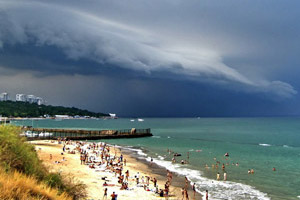
Так говорят о периоде спокойствия и бездействия, за которым следует период тревоги и напряжения.
История идиомы:
Происхождение этой английской идиомы о погоде легко объяснить обычными природными явлениями. Придумали это выражение моряки, которые заметили, что перед штормом погода всегда тихая и спокойная, на море штиль. Мы с вами тоже можем наблюдать такое явление: за несколько часов до грозы погода, как правило, безветренная и теплая, зато с началом дождя может прийти настоящая буря.
Пример употребления:
Their discussion is peaceful now but it’s only the calm before the storm. — Их дискуссия сейчас спокойная, но это затишье перед бурей.
А теперь предлагаем ознакомиться с еще 10 идиомами о погоде на английском языке:
| Идиома | Перевод | Пример употребления |
|---|---|---|
| Under the weather | Нездоровый, плохо себя чувствующий | I’m feeling under the weather today. I think I might have eaten too much.
Я плохо себя чувствую сегодня. Я думаю, что переел. |
| It never rains but it pours | Беда не приходит одна; начался дождь — ожидай ливня | Yesterday my car broke down, then I twisted my ankle. It never rains but it pours.
Вчера моя машина сломалась, потом я растянул лодыжку. Беда не приходит одна. |
| To not have the foggiest (idea) | Не иметь ни малейшего представления | — Do you know how to make shortbread cookie? — I don’t have the foggiest idea. — Ты знаешь, как делать песочное печенье? |
| To have one’s head in the clouds | Витать в облаках, мечтать | You might have your head in the clouds if you think I’m going to do your dishes every day.
Ты, должно быть, витаешь в облаках, если думаешь, что я собираюсь мыть твою посуду каждый день. |
| To be snowed under | Завален работой, очень занят | I’m afraid I can’t go to the theatre. I’m snowed under with work this week.
Я боюсь, я не могу пойти в театр. Я завален работой на этой неделе. |
| To chase rainbows | Гнаться за невозможным | You can’t become a professional footballer at 45. You should quit chasing rainbows.
Ты не можешь стать профессиональным футболистом в 45. Тебе следует перестать гоняться за невозможным. |
| A fair-weather friend | Друг, который с вами, только когда вы успешны; ненадежный друг | He is a fair-weather friend. He didn’t lend me a helping hand last year when I was ill.
Он друг, только когда ему удобно. Он не протянул мне руку помощи в прошлом году, когда я болел. |
| (As) right as rain | В полном порядке | I am so exhausted now but after a few hours of rest I will be as right as rain.
Я так изнурен сейчас, но после нескольких часов отдыха я буду в полном порядке. |
| A storm in a teacup | Буря в стакане, много шума из ничего | Newlyweds had a row yesterday but it was just a storm in a teacup.
Вчера молодожены поссорились, но это была только буря в стакане воды. |
| To put on ice | «Заморозить», отложить, повременить | We have to put this project on ice until our investors are able to put money in it.
Мы должны «заморозить» этот проект, пока наши инвесторы не смогут вложить в него деньги. |
Мы уверены, что у природы нет плохой погоды, а в этой статье нет плохих идиом о погоде на английском языке. Предложенные нами выражения сделают вашу речь выразительной и естественной, поэтому берите их себе на вооружение. И не забудьте подписаться на рассылку, чтобы своевременно узнавать о новых интересных статьях на нашем сайте.
© 2023 englex.ru, копирование материалов возможно только при указании прямой активной ссылки на первоисточник.
12 Weather Idioms
Наступила осень, и на смену теплым солнечным дням пришла ненастная, дождливая, облачная, ветреная погода. В английском языке много идиом, связанных с погодой и со словами дождь (rain), облака (clouds), шторм (storm) и ветер (wind).
Идиомы со словом «дождь»
1. it never rains but it pours — это выражение означает, что когда что-то плохое случается, за ним обязательно последуют другие плохие события – в русском языке можно найти много похожих по значению выражений, например, «пришла беда-отворяй ворота», «беда одна не ходит », «начался дождь — ожидай ливня», «лиха беда начало» — вот сколько их в могучем русском языке!
- I’ve had a terrible day. I was late for my work, lost the key, quarreled with the girlfriend. It never rains but it pours! — У меня был ужасный день. Я опоздал на работу, потерял ключи, поссорился с подружкой. Беда одна не ходит!
2. take a rain check — отложить какое-то мероприятие на более поздний срок. Происхождение выражения 
- I’m so tired that I cannot go to the movies today. I’ll ask for taking a rain check — Я так устала, что не могу сегодня пойти в кино. Как-нибудь в другой раз.
Идиомы со словом «облака»
3. every cloud has a silver lining — «у каждого облака есть серебряная подкладка» — данное выражение означает, что после чего-то плохого обязательно наступит хорошее, и всегда есть место надежде, даже в наихудшей ситуации. Поищем аналоги в русском языке – «нет худа без добра», «не было бы счастья, да несчастье помогло»
- Every cloud has a silver lining – when I got ill and was near to death I met you at the hospital and now I’m the happier man in the world. – нет худа без добра – когда я заболел и чуть не умер я встретил в больнице тебя, и сейчас я самый счастливый человек в мире.
4. to have your head in the clouds – «витать в облаках», не соприкасаться с реальностью – так говорят о тех, кого посещают идеи и мысли, которые трудно назвать разумными или практичными.
- I don’t know what to think about Mary — she has her head in the clouds – я не знаю что думать о Мэри – она витает в облаках.
5. under a cloud – «под подозрением» — если кто-то подозреваем в плохих деяниях.
- I heard the company she worked at was under a cloud of fraud – я слышал, что компания, в которой она работала подозревалась в мошенничестве.
6. on cloud nine – у англичан на девятом облаке, а у нас на седьмом небе от счастья – нет надобности говорить, что это только про очень счастливых людей.
- They are going to marry next week and feel themselves on cloud nine.
Идиомы со словом «шторм»
7. storm in a teacup – русский эквивалент — «буря в стакане воды» — создать большую суматоху из-за чего-то незначительного, т.е. «сделать из мухи слона».
- Don’t make a storm in a teacup – this small cut can’t be dangerous- не делай из мухи слона – этот маленькие порез не может быть опасным
8. the calm before the storm – затишье перед бурей – период спокойствия перед периодом большой активности.
- She sat down with a book and a cup of tea enjoying the calm before the storm when the children would wake up. — Она села с книжкой и чашкой чая, наслаждаясь затишьем перед бурей, которая разразится когда дети проснутся.
Идиомы со словом «ветер»
9. sail close to the wind – «вести себя на грани дозволенного, или быть на грани преступления, ходить по краю пропасти» — вот варианты перевода этого выражения.
- Be careful! You sail close to the wind making friends with this terrible man – Будь осторожен! ты ходишь по краю пропасти, общаясь с этим ужасным человеком.
10. to get wind of – выяснить что-то, обычно случайно, или узнать из конфиденциального источника, можно сказать «напасть на след».
- If the police get wind of the evidence of the crime, committed by you, you’ll be taken to prison — если полиция получит доказательства преступления, совершенного тобой, тебя посадят в тюрьму.
11. a windfall – неожиданная прибыль, которая сваливается нам как снег на голову: выигрыш в лотерею, неожиданная денежная премия и пр.
- With that windfall I got from my boss I will go directly to the boutique – Получив премию от начальства, я отправлюсь прямо в бутик!
И последняя идиома – со словом погода – weather:
12. to be under the weather – болеть, плохо себя чувствовать
- Sorry, I cannot come today; I am feeling under the weather and would rather stay in bed. – Извините, я сегодня не смогу прийти, мне нездоровится, и я лучше останусь в постели.
А вы знаете еще какие-нибудь погодные идиомы?
На этой странице представлены идиомы о погоде (Weather Idioms).
| Weather Idioms | Перевод |
| to break the ice | разрядить обстановку, завязать разговор |
| a breeze | легкотня, пустяки |
| to leave someone hanging in the breeze | подвести под монастырь |
| come rain or shine | при любых обстоятельствах |
| a fair-weather friend | ненадежный друг |
| full of hot air | неуместный, мелющий чепуху |
| to have one’s head in the clouds | витать в облаках |
| to rain cats and dogs | лить как из ведра |
| to save something for a rainy day | отложить на черный день |
| to weather the storm | выдержать испытание, справиться с трудностями |
| To be under the weather. | недомогать, плохо себя чувствовать. |
| To blow hot and cold | колебаться, быть нерешительным, постоянно менять свою точку зрения. |
| To be snowed under | быть заваленным работой |
| Not have the foggiest idea | понятия не иметь |
| Like lightning | очень быстро. |
| A storm in a teacup | буря в стакане воды, много шума из ничего |
| To be on cloud nine/to be in seventh heaven | быть на седьмом небе от счастья |
| To be in flood of tears | заливаться слезами |
| A sunny smile | лучезарная улыбка |
| A frosty look | холодный взгляд |
| A storm of protest | буря протеста |
| To shower smn with gifts | заваливать подарками |
| A hail of bullets | град пуль |
| Gales of laughter | взрыв смеха |




